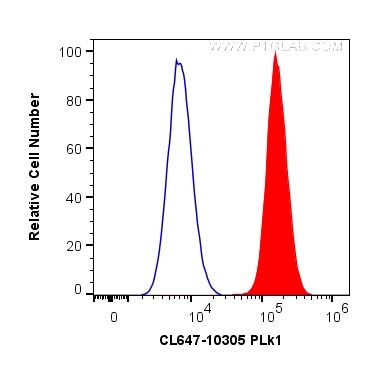- Phare
- Validé par KD/KO
Anticorps Polyclonal de lapin anti-PLK1
PLK1 Polyclonal Antibody for FC (Intra)
Hôte / Isotype
Lapin / IgG
Réactivité testée
Humain, rat, souris
Applications
FC (Intra)
Conjugaison
CoraLite® Plus 647 Fluorescent Dye
N° de cat : CL647-10305
Synonymes
Galerie de données de validation
Applications testées
| Résultats positifs en cytométrie | cellules HeLa |
Dilution recommandée
| Application | Dilution |
|---|---|
| Flow Cytometry (FC) | FC : 0.20 ug per 10^6 cells in a 100 µl suspension |
| It is recommended that this reagent should be titrated in each testing system to obtain optimal results. | |
| Sample-dependent, check data in validation data gallery | |
Informations sur le produit
CL647-10305 cible PLK1 dans les applications de FC (Intra) et montre une réactivité avec des échantillons Humain, rat, souris
| Réactivité | Humain, rat, souris |
| Hôte / Isotype | Lapin / IgG |
| Clonalité | Polyclonal |
| Type | Anticorps |
| Immunogène | PLK1 Protéine recombinante Ag0284 |
| Nom complet | polo-like kinase 1 (Drosophila) |
| Masse moléculaire calculée | 68 kDa |
| Poids moléculaire observé | 62 kDa |
| Numéro d’acquisition GenBank | BC002369 |
| Symbole du gène | PLK1 |
| Identification du gène (NCBI) | 5347 |
| Conjugaison | CoraLite® Plus 647 Fluorescent Dye |
| Excitation/Emission maxima wavelengths | 654 nm / 674 nm |
| Forme | Liquide |
| Méthode de purification | Purification par affinité contre l'antigène |
| Tampon de stockage | PBS avec glycérol à 50 %, Proclin300 à 0,05 % et BSA à 0,5 %, pH 7,3. |
| Conditions de stockage | Stocker à -20 °C. Éviter toute exposition à la lumière. Stable pendant un an après l'expédition. L'aliquotage n'est pas nécessaire pour le stockage à -20oC Les 20ul contiennent 0,1% de BSA. |
Informations générales
PLK1(Polo-like kinase 1), also named as PLK and STPK13, belongs to the protein kinase superfamily, Ser/Thr protein kinase family and CDC5/Polo subfamily. PLK1 is a Serine/threonine-protein kinase that performs several important functions throughout M phase of the cell cycle, including the regulation of centrosome maturation and spindle assembly, the removal of cohesins from chromosome arms, the inactivation of APC/C inhibitors, and the regulation of mitotic exit and cytokinesis.The localization of Polo changes during the cell cycle. In interphase, Polo shows a mostly diffuse cytoplasmic localization. Polo becomes concentrated on centrosomes from early prophase and appears on centromeres or kinetochores from late prophase, before nuclear envelope breakdown (NEB). After anaphase onset, Polo relocalizes to the central spindle and remains enriched at the midbody ring in late stages of cytokinesis (PMID: 29167465).
Protocole
| Product Specific Protocols | |
|---|---|
| FC protocol for CL Plus 647 PLK1 antibody CL647-10305 | Download protocol |
| Standard Protocols | |
|---|---|
| Click here to view our Standard Protocols |


